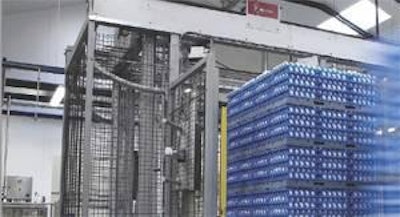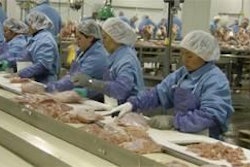
Egg packing plants are increasingly turning to plastic and away from moulded fibre and other materials more traditionally associated with the industry.
The move to plastic has been driven by a number of factors. In part, this change has been due to the increasing use of recycled material in moulded fibre packing, which has resulted in a deterioration of quality. But the greater resistance of plastic means that greater automation within plants is possible, and, importantly, it is more hygienic.
The UK's Deans Foods, for example, which merged with Stonegate to form Noble Foods, and which switched to plastic in 2006 and 2007, believes that plastic not only raises the image of the industry but also significantly improves efficiencies in egg handling from farm to packing centre.
A company spokesperson commented: "The benefits of moving to plastic from moulded fibre are numerous. Hygiene is improved greatly, as trays and pallets are washed at the packing centre before being delivered. Recycling of plastic trays is more environmentally friendly and mirrors the system already in use by retailers for other fresh food products."
Variety of benefits
With the numerous initiatives around the world to reduce Salmonella, the hygiene of egg packing is increasingly important. Contamination in egg packing plants may be a significant contributing factor to the external contamination of shell eggs, making the cleaning of packaging and equipment increasingly important.
To address this problem, Denmark's Echberg Manutech, which designs and manufactures washing systems and end of line machinery for the food and beverage industries, has designed an automatic system to handle, wash and stack all packing material that is returned to farmers, which was recently installed at Hedegaard Foods.
The fully automated handling and washing line for the egg packing industry sees pallets and dividers automatically received directly from the destacker and conveyed to the washing machine. After washing, pallets and dividers are blown dry before entering a special combined palletiser.
The combined palletiser joins the pallets, dividers and egg trays to units of four pallets, 1,440 trays and 16 dividers, ready to be delivered back to egg producers.
The company notes that as more businesses are changing over to plastic packing materials, demand for the fully automated handling of all materials is growing.
Contamination in egg packing plants may be a significant contributory factor in the external contamination of shell eggs, where packing materials are reused unless they are thoroughly cleaned.
Smooth transition
Executive director of Hedegaard Foods, Ivan Noes Jorgensen, explains that the Echberg machinery was needed following the investment in plastic trays, dividers and pallets.
The firm moved to working with plastic trays some 18 months ago and had the tray washer installed at the same time. Before this, pallets and dividers were subject to high pressure hand cleaning.
He said Denmark is working with a zero tolerance policy for Salmonella and so trays must be cleaned and disinfected before leaving the packing station to avoid cross-contamination. Additionally, cleaning and disinfection help to prevent other bacteria and insects from spreading from farm to farm.
The washing machines are integrated with the facility's Moba and Prinzen machinery in an inline system and the move to adopt plastic has also resulted in greater efficiency and logistics flow. Prior to the change, Hedegaard was only able to have 8,640 eggs per pallet. Now the company has 10,800.
The efficiency of the Moba machine has increased, labour requirements have gone down and there is greater automation that was not possible with paper trays.
The change has not resulted in any difficulties for Hedegaard but some adjustments have had to be made. Machinery at the packing station has had to be adjusted as well as that at farms. Jorgensen notes that due to careful planning and fully sharing information with partners, the switch went smoothly.
Additionally, because the plastic trays are expensive, Hedegaard now invoices farmers every time they receive packaging and this is credited back to them once the packaging is returned.
So has the change been worthwhile? Clearly, carefully washed and disinfected trays reduce the risk of spreading disease, and for Hedegaard, because of efficiencies, payback for the entire investment, materials and machinery, should be achieved within three years.



.jpg?auto=format%2Ccompress&fit=crop&h=167&q=70&w=250)














